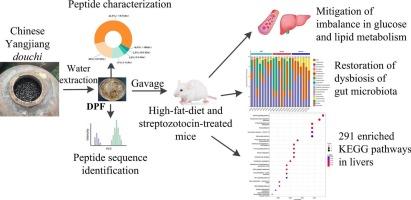Anti-diabetic effects of douchi-derived peptide-rich fraction on high-fat-diet and streptozotocin-treated mice and the underlying mechanisms by gut microbial metagenomic and hepatic transcriptomic profiling
IF 4
2区 农林科学
Q2 FOOD SCIENCE & TECHNOLOGY
引用次数: 0
Abstract
In this study, a peptide-rich fraction (DPF) was isolated from Chinese douchi. The chemical compositions and peptide sequences of DPF were characterized. Subsequently, DPF was administered to high-fat diet (HFD)- and streptozotocin (STZ)-treated mice to evaluate its anti-diabetic potential. DPF contained 65.0 % peptide (by dry weight), with 288 peptide sequences identified. Animal experiments demonstrated that DPF significantly mitigated weight loss, decreased damage to the liver and pancreas, reduced glucose levels, improved glucose intolerance, increased insulin levels, and lowered total cholesterol, triglycerides, and low-density lipoprotein cholesterol levels in HFD- and STZ-treated mice compared to diabetic mice, underscoring its anti-diabetic effects. Moreover, DPF partially counteracted the dysbiosis of gut microbiota in mice. Furthermore, hepatic transcriptomic profiling identified 821 differentially expressed genes, corresponding to 291 enriched KEGG pathways. These findings advance the current understanding of the bioactive potential of Chinese douchi and support its applications in functional foods for diabetes management.

通过肠道微生物宏基因组学和肝脏转录组学分析,豆豉衍生的富含肽部分对高脂肪饮食和链脲霉素治疗小鼠的抗糖尿病作用及其潜在机制
本研究从豆豉中分离得到一种富含肽的部位(DPF)。表征了DPF的化学组成和肽序列。随后,将DPF给予高脂肪饮食(HFD)和链脲佐菌素(STZ)处理的小鼠,以评估其抗糖尿病潜能。DPF含65.0%的肽(以干重计),鉴定出288条肽序列。动物实验表明,与糖尿病小鼠相比,DPF显著减轻了HFD和stz治疗小鼠的体重减轻,减少了肝脏和胰腺的损伤,降低了葡萄糖水平,改善了葡萄糖耐受不良,增加了胰岛素水平,降低了总胆固醇、甘油三酯和低密度脂蛋白胆固醇水平,强调了其抗糖尿病作用。此外,DPF部分抵消了小鼠肠道菌群失调。此外,肝脏转录组学分析鉴定出821个差异表达基因,对应291个富集的KEGG通路。这些发现促进了目前对中国豆豉生物活性潜力的认识,并支持其在糖尿病管理功能食品中的应用。
本文章由计算机程序翻译,如有差异,请以英文原文为准。
求助全文
约1分钟内获得全文
求助全文
来源期刊

Journal of Functional Foods
FOOD SCIENCE & TECHNOLOGY-
CiteScore
9.60
自引率
1.80%
发文量
428
审稿时长
76 days
期刊介绍:
Journal of Functional Foods continues with the same aims and scope, editorial team, submission system and rigorous peer review. We give authors the possibility to publish their top-quality papers in a well-established leading journal in the food and nutrition fields. The Journal will keep its rigorous criteria to screen high impact research addressing relevant scientific topics and performed by sound methodologies.
The Journal of Functional Foods aims to bring together the results of fundamental and applied research into healthy foods and biologically active food ingredients.
The Journal is centered in the specific area at the boundaries among food technology, nutrition and health welcoming papers having a good interdisciplinary approach. The Journal will cover the fields of plant bioactives; dietary fibre, probiotics; functional lipids; bioactive peptides; vitamins, minerals and botanicals and other dietary supplements. Nutritional and technological aspects related to the development of functional foods and beverages are of core interest to the journal. Experimental works dealing with food digestion, bioavailability of food bioactives and on the mechanisms by which foods and their components are able to modulate physiological parameters connected with disease prevention are of particular interest as well as those dealing with personalized nutrition and nutritional needs in pathological subjects.
 求助内容:
求助内容: 应助结果提醒方式:
应助结果提醒方式:


